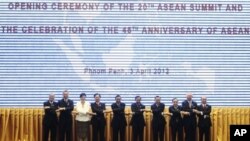Philippine President Benigno Aquino is calling on the 10-member Association of Southeast Asian Nations - ASEAN - to forge a code of conduct on territorial claims in the South China Sea, before negotiating with China to ease festering regional tensions.
Aquino, speaking Tuesday in the Cambodian capital Phnom Penh, told other ASEAN heads of state that the grouping must "maintain centrality" in its dealings with Beijing. ASEAN countries and non-member China hold conflicting claims to potential mineral and energy deposits in the vast South China Sea, and several recent naval confrontations have raised regional tensions.
China has sought to negotiate with individual ASEAN countries, and it was not clear from Tuesday's summit proceedings how or if the two positions will be reconciled.
Cambodian Prime Minister Hun Sen, whose country holds the rotating ASEAN chair, opened the two-day summit Tuesday with a call for member-countries to work to narrow the gap between the region's richest and poorest countries.
"Within the region, although the development gap among ASEAN members has been noticeably narrow, it is still huge," he said. "This requires to double our efforts to promote further growth and improve equitable distribution of the fruits of growth at both the national and the regional among members countries."
Cambodia maintains close ties with Beijing, and analysts predicted ahead of the summit that Phnom Penh, as a key benefactor of Chinese investment, would seek to minimize the maritime disputes as summit host.
The Philippines, Vietnam, Malaysia and Brunei all claim parts of the potentially resource-rich South China Sea, putting them at odds with Beijing, which claims the entire 3.5 million-square-kilometer area. The Philippines and Vietnam have both accused Chinese vessels of intruding into their exclusive economic zones and disrupting oil exploration activities. Both Manila and Hanoi have acquired new navy ships as they vow to defend their claims, while China has acquired its first aircraft carrier.
Separately Tuesday, several ASEAN members raised concerns about North Korea's planned missile launch later this month. Pyongyang says the rocket will place a weather satellite into orbit. But the United States and other nations say the launch violates United Nations' sanctions prohibiting Pyongyang from launching rockets capable of carrying nuclear warheads.
ASEAN includes Brunei, Cambodia, Indonesia, Laos, Malaysia, Burma, the Philippines, Singapore, Thailand and Vietnam.
Some information for this report was provided by AP and AFP.




